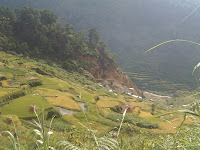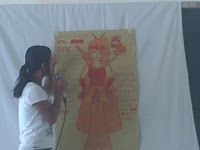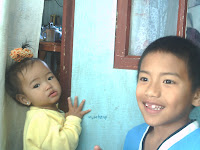
Ecotourism is probably one of the most abused words in the tourism industry. It is the cry of almost all promoters of tourism in any place with natural environmental beauty.
However, ecotourism is not merely marketing the natural environmental beauty of a place. The United Nations described the general characteristics of ecotourism as (1) nature-based forms of tourism in which the main motivation of the tourists is the appreciation of nature as well as traditional cultures in natural areas; (2) contains educational and interpretation features; (3) generally, but not exclusively organized for small groups by specialized and small, locally owned businesses; (4)minimizes negative impacts upon the natural and socio-cultural environment; and (5)supports the protection of natural areas.
Ecotourism then goes beyond what the eyes can see. It’s not merely earning money through the environment but making the least damage to it. While tourism is the most expensive industry, it is also the most destructive. Sometimes, even those claiming for ecotourism are the very ones violating the very same concept.
In ecotourism, it matters much who controls the resources because control of the resources ends up to those who controls the profit. In Sagada, all tourism amenities like hotels, restaurants, souvenir shops are owned by the Isagada. No non-Isagada, even by disguise, owns any business establishment in the town.
Even the Sagada Environmental Guides Association, which is the front liner of the tourism industry is one hundred percent composed of Isagada. The environmental fee of ten pesos which is now being collected by the Municipal Government was once under the care of the SEGA. And, from it, they had thought and implemented projects that improved the tourist spots but did not really removed the thrill or the natural beauty of the place. Yet, even when the collection was transferred to the Municipal Government, still the control is in the hands of the locals.
tourism industry is one hundred percent composed of Isagada. The environmental fee of ten pesos which is now being collected by the Municipal Government was once under the care of the SEGA. And, from it, they had thought and implemented projects that improved the tourist spots but did not really removed the thrill or the natural beauty of the place. Yet, even when the collection was transferred to the Municipal Government, still the control is in the hands of the locals.
The projects that might have improved the tourist spots are conceptualized not only to serve the tourists but also the locals. And, it is only implemented if it incurs the least damage to nature. In ecotourism, it is very important that the voice of the locals should be heard and it is only with them that it is implemented. This is based on the contention that the locals know what is best for them and the community.
Almost 15 years ago, there was a proposal to build a five-star hotel in Sagada through the Philippine Tourism Authority. This was disapproved by the locals and the reigning Municipal Local Government Unit officials at that time. At first thought, questions such as why would they do such a thing when tourism is starting to be the lifeblood of some Isagada. It seems it was not right to do so. However, on second thought, it was after all for the good of the Isagada. It was ecotourism all along. If they would have allowed a five-star hotel, will the Isagada be in control? They say it generates more income and jobs. True, but what kind of jobs? The locals are not the owner of the hotel. They will for sure be there to work only to serve, and who will benefit from the income? In a way, they will but not directly.
Another point raised was, the Isagada sometimes lack water. If there will be a five-star hotel, of course, the concentration of the water will be on the hotel itself. One flush for the toilet bowl is almost enough for one to use to take a bath. And, will the five star hotel serve the locals? For sure it will not as a hotel but it would be for their eyes only.
Such contentions may seem to be arrogant to some but it is ecotourism in the whole sense of the word. Whatever amenities put up should not only be serving the tourists but also the locals.
Culture is not to be marketed. The culture of the Igorots had always amused tourists and even locals themselves. But, cultural practices were done only when they are supposed to be done. Traditional practices are not done for tourists’ amusement only. Old folks follow their calendar so if the tourists want to witness such practices, they have to adjust to the schedules of the locals and not vice versa. And, the practices are not done on artificial settings but on where such practices are really to be done like the “dap-ay.”
If there had been rumors on some locals being paid to perform some rituals, social ostracism, even oral ones, had righted the acts. In other words, the control of the locals and their way of disciplining the errant, even the older folks, had always been effective.
Though commercialization of culture is very rampant nowadays, Sagada is still not going with the flow. Again, this makes it an ecotourist destination in the real sense of the word – avoiding destruction of nature as well as culture.
Another feature of ecotourism is the motto of some guides, “if you are in Rome, do what the Romans do.” Putting it in context, if you are in Sagada, do what the the Isagada do. In other words, while the Isagada would adjust to the tourists in one way, the tourists should also adjust. It is a two way traffic and both parties should meet at the center. The Isagada should not adjust all through out to cater to the whims of every visitor as well as the tourists should not adjust all throughout to cater to the whims of every locals. Each party should share a part of him/her and each should understand each other. Both parties, in a way is partly educating the other. So, tourism is also a powerful way of sharing who you are.
However, ecotourism is not merely marketing the natural environmental beauty of a place. The United Nations described the general characteristics of ecotourism as (1) nature-based forms of tourism in which the main motivation of the tourists is the appreciation of nature as well as traditional cultures in natural areas; (2) contains educational and interpretation features; (3) generally, but not exclusively organized for small groups by specialized and small, locally owned businesses; (4)minimizes negative impacts upon the natural and socio-cultural environment; and (5)supports the protection of natural areas.
Ecotourism then goes beyond what the eyes can see. It’s not merely earning money through the environment but making the least damage to it. While tourism is the most expensive industry, it is also the most destructive. Sometimes, even those claiming for ecotourism are the very ones violating the very same concept.
In ecotourism, it matters much who controls the resources because control of the resources ends up to those who controls the profit. In Sagada, all tourism amenities like hotels, restaurants, souvenir shops are owned by the Isagada. No non-Isagada, even by disguise, owns any business establishment in the town.
Even the Sagada Environmental Guides Association, which is the front liner of the
 tourism industry is one hundred percent composed of Isagada. The environmental fee of ten pesos which is now being collected by the Municipal Government was once under the care of the SEGA. And, from it, they had thought and implemented projects that improved the tourist spots but did not really removed the thrill or the natural beauty of the place. Yet, even when the collection was transferred to the Municipal Government, still the control is in the hands of the locals.
tourism industry is one hundred percent composed of Isagada. The environmental fee of ten pesos which is now being collected by the Municipal Government was once under the care of the SEGA. And, from it, they had thought and implemented projects that improved the tourist spots but did not really removed the thrill or the natural beauty of the place. Yet, even when the collection was transferred to the Municipal Government, still the control is in the hands of the locals.The projects that might have improved the tourist spots are conceptualized not only to serve the tourists but also the locals. And, it is only implemented if it incurs the least damage to nature. In ecotourism, it is very important that the voice of the locals should be heard and it is only with them that it is implemented. This is based on the contention that the locals know what is best for them and the community.
Almost 15 years ago, there was a proposal to build a five-star hotel in Sagada through the Philippine Tourism Authority. This was disapproved by the locals and the reigning Municipal Local Government Unit officials at that time. At first thought, questions such as why would they do such a thing when tourism is starting to be the lifeblood of some Isagada. It seems it was not right to do so. However, on second thought, it was after all for the good of the Isagada. It was ecotourism all along. If they would have allowed a five-star hotel, will the Isagada be in control? They say it generates more income and jobs. True, but what kind of jobs? The locals are not the owner of the hotel. They will for sure be there to work only to serve, and who will benefit from the income? In a way, they will but not directly.
Another point raised was, the Isagada sometimes lack water. If there will be a five-star hotel, of course, the concentration of the water will be on the hotel itself. One flush for the toilet bowl is almost enough for one to use to take a bath. And, will the five star hotel serve the locals? For sure it will not as a hotel but it would be for their eyes only.
Such contentions may seem to be arrogant to some but it is ecotourism in the whole sense of the word. Whatever amenities put up should not only be serving the tourists but also the locals.
Culture is not to be marketed. The culture of the Igorots had always amused tourists and even locals themselves. But, cultural practices were done only when they are supposed to be done. Traditional practices are not done for tourists’ amusement only. Old folks follow their calendar so if the tourists want to witness such practices, they have to adjust to the schedules of the locals and not vice versa. And, the practices are not done on artificial settings but on where such practices are really to be done like the “dap-ay.”
If there had been rumors on some locals being paid to perform some rituals, social ostracism, even oral ones, had righted the acts. In other words, the control of the locals and their way of disciplining the errant, even the older folks, had always been effective.
Though commercialization of culture is very rampant nowadays, Sagada is still not going with the flow. Again, this makes it an ecotourist destination in the real sense of the word – avoiding destruction of nature as well as culture.
Another feature of ecotourism is the motto of some guides, “if you are in Rome, do what the Romans do.” Putting it in context, if you are in Sagada, do what the the Isagada do. In other words, while the Isagada would adjust to the tourists in one way, the tourists should also adjust. It is a two way traffic and both parties should meet at the center. The Isagada should not adjust all through out to cater to the whims of every visitor as well as the tourists should not adjust all throughout to cater to the whims of every locals. Each party should share a part of him/her and each should understand each other. Both parties, in a way is partly educating the other. So, tourism is also a powerful way of sharing who you are.
Though there are still so many things that need to be improved in Sagada’s tourism industry, as of now, it is still what we call an ecotourist spot in the real sense of the term.













.jpg)
.jpg)